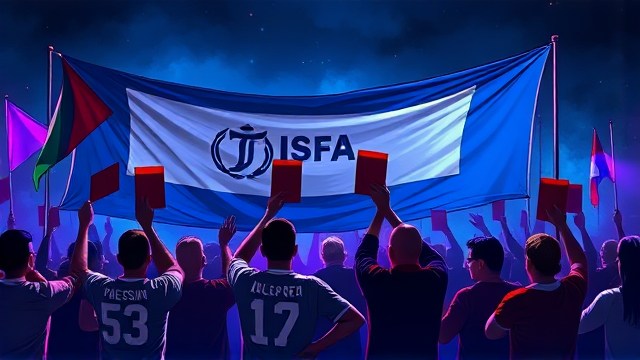Pro-Palestinian Protest Against Israel Before Italy World Cup Qualifier
The beautiful game, so often a theater of dreams, once again finds itself an unwilling stage for the world’s most intractable conflicts as the Italian national team prepares to host Israel in a 2026 World Cup qualifier on October 14th. On the eve of this high-stakes match, the pitch was preempted by a protest, with roughly twenty pro-Palestinian activists converging on the headquarters of the Italian Football Federation, brandishing red cards and unfurling a stark banner that read, 'World Championship Without Israel.' This was not merely a demonstration; it was a direct challenge to the very soul of international sport. One protester, his voice cutting through the anticipatory hum of the matchday eve, articulated a sentiment growing louder in certain corners of the sporting world: that the Israeli national team is a vehicle for 'sportswashing,' a calculated effort to launder the image of a state they accuse of genocide through the universal appeal of football.The historical echoes are impossible to ignore, drawing an immediate and potent parallel to the blanket bans imposed on Russian athletes following the invasion of Ukraine. Another demonstrator pointedly asked why the rules seemed to apply differently, noting that if the precedent set with Russia was truly universal, Israel would likewise be forbidden from competing under its own flag.The core of their grievance, amplified through a megaphone by one of the rally's organizers, was the perceived 'double standards of the West'—a condemnation of what they see as a swift, decisive response in some geopolitical contexts and a paralyzing inertia in others, where 'two years of occupation and genocide' have been insufficient to trigger the same sporting ostracism. This incident is far from an isolated one; it is the latest flare-up in a long-burning debate about the intersection of politics and sport, a debate that has ensnared everything from the Olympics to FIFA's own governance.The concept of 'sportswashing' itself has gained significant traction in recent years, with critics pointing to events like the Saudi-backed LIV Golf tour and Qatar's hosting of the 2022 World Cup as prime examples of nations using athletic prestige to divert attention from human rights records. The protest outside the Italian Federation forces us to confront a fundamental question: where does the line between a nation's right to compete and the international community's moral responsibility truly lie? Football associations and global governing bodies consistently assert that sport and politics should remain separate, yet this separation has always been a fiction; from the Black Power salutes at the 1968 Olympics to the anti-apartheid sports boycotts, the playing field has repeatedly been a site of profound political expression.The specific comparison to Russia's ban is particularly thorny. Following the 2022 invasion, FIFA and UEFA moved with remarkable speed to suspend Russian teams from international competition, a decision justified as being 'for the good of the game and in the spirit of solidarity.' The protesters in Rome are demanding that same logic be applied with consistency, arguing that the scale and duration of the conflict in Gaza warrant an equivalent, if not greater, response. This puts FIFA in an incredibly difficult position, caught between powerful geopolitical blocs, its own stated principles, and the immense commercial and political pressures that accompany the world's most popular sport.The Israeli Football Association has, unsurprisingly, consistently rejected such comparisons and accusations, maintaining that its team represents the hope and unity of its people and should not be punished for the actions of its government. Meanwhile, security for the qualifier itself will undoubtedly be at an unprecedented level, with Italian authorities keenly aware that the symbolic protest outside the federation's doors could be a prelude to more significant disruptions inside or outside the stadium.For the players, this geopolitical maelstrom creates an impossible burden, forcing athletes who should be focused on tactics and technique to instead become unwitting symbols in a global conflict. The match itself will now be played under a microscope, its every pass and tackle analyzed not just for sporting merit but for political subtext. The final scoreline will be recorded in the standings, but the real outcome of this qualifier will be its contribution to an ongoing, and increasingly urgent, conversation about the price of principle and the heavy weight of a jersey when it represents more than just a nation, but a war.
Latest News
In a breathtaking display of raw athleticism that evoked memories of Barry Sanders' most electrifying runs, Atlanta Falcons rookie sensation Bijan Robinson
32 minutes ago0 comments
The Arizona Cardinals' 31-27 loss to the Indianapolis Colts on Sunday felt less like another notch in their four-game losing streak and more like a seismic
52 minutes ago0 comments
The NHL’s regular season is heating up, and if last night’s action is any indicator, we’re in for another wild ride.
1 hour ago0 comments
The NFL's Monday Night Football doubleheader concludes with a compelling NFC showdown between the Chicago Bears and Washington Commanders at Northwest Stadium,
1 hour ago0 comments
The Miami Dolphins' season continues to unravel in spectacular fashion, with quarterback Tua Tagovailoa's postgame comments following Sunday's 29-27 loss to
1 hour ago1 comments
In a stunning twist of fate that will be debated in Russian hockey circles for years, SKA Saint Petersburg snapped Avtomobilist Yekaterinburg's formidable
1 hour ago0 comments
In a dramatic Monday night showdown that will be debated in KHL taverns for years, SKA St.
2 hours ago0 comments
In a move that feels less like a routine practice squad addition and more like a calculated chess play, the New York Giants are strategically reuniting rookie
2 hours ago0 comments
It’s quiet here...Start the conversation by leaving the first comment.
